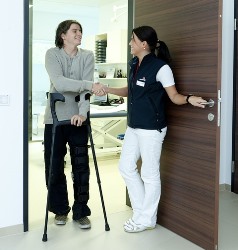How to Enroll In the Best LVN or LPN Course Near Philadelphia Pennsylvania
 Once you have decided on a rewarding vocation in the field of nursing, it's essential that you find a Licensed Practical Nurse (LPN) program near Philadelphia PA that will provide the proper training. If you live in Texas or California, then you will be searching for a Licensed Vocational Nurse (LVN) school instead. There is no difference, aside from the names, between an LPN and an LVN. They both undertake the same job functions and work in healthcare facilities under the guidance of Registered Nurses (RN) or Doctors. But their functions do differ depending on the state they practice in, which we will talk about in the following segment. When beginning their search for schools, many prospective nursing students begin with those that are the nearest to their houses or that are the least expensive. Even though cost and location are significant points to consider, they are not the only qualifications that you should base your decision on. Other concerns, such as if the schools are accredited or have high pass rates on the licensing exam are very important too. There are additional questions that you should ask potential schools before enrolling in a LPN or LVN training program that we will cover later in this article. But to start with, let's take a look at the function of an LPN and what is involved in the instruction and licensing process.
Once you have decided on a rewarding vocation in the field of nursing, it's essential that you find a Licensed Practical Nurse (LPN) program near Philadelphia PA that will provide the proper training. If you live in Texas or California, then you will be searching for a Licensed Vocational Nurse (LVN) school instead. There is no difference, aside from the names, between an LPN and an LVN. They both undertake the same job functions and work in healthcare facilities under the guidance of Registered Nurses (RN) or Doctors. But their functions do differ depending on the state they practice in, which we will talk about in the following segment. When beginning their search for schools, many prospective nursing students begin with those that are the nearest to their houses or that are the least expensive. Even though cost and location are significant points to consider, they are not the only qualifications that you should base your decision on. Other concerns, such as if the schools are accredited or have high pass rates on the licensing exam are very important too. There are additional questions that you should ask potential schools before enrolling in a LPN or LVN training program that we will cover later in this article. But to start with, let's take a look at the function of an LPN and what is involved in the instruction and licensing process.
It Only Takes a Few Minutes to Start Your LPN or LVN Career Below
Job Duties of an LPN or LVN

Licensed Practical Nurses have many duties that they perform in the Philadelphia PA medical facilities where they work. As their titles indicate, they are mandated to be licensed in all states, including Pennsylvania. Although they may be responsible for overseeing Certified Nursing Assistants (CNA), they themselves usually work under the guidance of either an RN or a doctor. The medical care facilities where they work are numerous and diverse, including hospitals, medical clinics, schools, and long-term care facilities. Anyplace that you can find patients in need of medical care is their dominion. Each state not only regulates their licensing, but also what work activities an LPN can and can't perform. So depending on the state, their day-to-day work functions might include:
- Checking vital signs
- Giving medications
- Starting IV drips
- Monitoring patients
- Taking blood or urine samples
- Maintaining patient records
- Supporting physicians or Registered nurses with procedures
Along with their occupational responsibilities being governed by each state, the health facilities or other Philadelphia PA healthcare providers where LPNs work can additionally limit their job roles within those parameters. Also, they can work in various specialties of nursing, including long-term care, critical care, oncology and cardiology.
LPN Courses
There are generally two academic credentials offered that provide training to become an LPN or LVN near Philadelphia PA. The one that can be concluded in the shortest period of time, typically about twelve months, is the certificate or diploma course. The 2nd choice is to earn a Practical Nursing Associate Degree. These LPN programs are broader in nature than the diploma alternative and usually require 2 years to complete. The advantage of Associate Degrees, along with offering a higher credential and more in-depth instruction, are that they provide more transferable credit toward a Bachelor's Degree in nursing. No matter the type of credential you seek, it needs to be state approved and ideally accredited by the National League for Nursing Accrediting Commission (NLNAC) or any other national accrediting organization. The NLNAC guarantees that the course of study effectively prepares students to become Practical Nurses, and that most graduates pass the 50 state required NCLEX-PN licensing exam.Enrolling in LPN and LVN Online Classes
 Attending LPN schools online is becoming a more popular way to receive training and earn a nursing certificate or degree in Philadelphia PA. Certain schools will require attendance on campus for a component of the training, and almost all programs require a certain amount of clinical rotation hours conducted in a local healthcare facility. But since the rest of the training may be accessed online, this alternative may be a more convenient approach to finding the time to attend college for many students. Regarding tuition, many online degree programs are less expensive than other on campus options. Even supplemental expenses such as for commuting and study materials can be minimized, helping to make education more economical. And many online programs are accredited by U.S. Department of Education recognized organizations. Therefore if your job and household obligations have left you with very little time to pursue your academic goals, it could be that an online LPN school will make it more convenient to fit a degree into your hectic schedule.
Attending LPN schools online is becoming a more popular way to receive training and earn a nursing certificate or degree in Philadelphia PA. Certain schools will require attendance on campus for a component of the training, and almost all programs require a certain amount of clinical rotation hours conducted in a local healthcare facility. But since the rest of the training may be accessed online, this alternative may be a more convenient approach to finding the time to attend college for many students. Regarding tuition, many online degree programs are less expensive than other on campus options. Even supplemental expenses such as for commuting and study materials can be minimized, helping to make education more economical. And many online programs are accredited by U.S. Department of Education recognized organizations. Therefore if your job and household obligations have left you with very little time to pursue your academic goals, it could be that an online LPN school will make it more convenient to fit a degree into your hectic schedule.
Questions to Ask LPN and LVN Schools
Once you have decided on obtaining your LPN certificate, and if you will attend classes on campus or on the internet, you can utilize the following guidelines to start narrowing down your choices. As you probably realize, there are a large number of nursing schools and colleges near Philadelphia Pa as well as within Pennsylvania and throughout the United States. So it is necessary to decrease the number of schools to choose from so that you will have a manageable list. As we previously discussed, the site of the school and the expense of tuition are most likely going to be the first two things that you will consider. But as we also emphasized, they should not be your sole qualifiers. So prior to making your final choice, use the following questions to evaluate how your selection compares to the field.
- Accreditation. It's a good idea to make sure that the certificate program in addition to the school are accredited by a U.S. Department of Education acknowledged accrediting organization. Besides helping confirm that you receive an excellent education, it may help in acquiring financial aid or student loans, which are often not available for non-accredited schools near Philadelphia Pennsylvania.
- Reputation. Look at online rating services to see what the assessments are for all of the LPN schools you are considering. Ask the accrediting organizations for their reviews as well. Also, check with the Pennsylvania school licensing authority to check out if there are any complaints or compliance issues. Finally, you can contact some nearby Philadelphia PA healthcare organizations you're interested in working for after graduation and ask what their opinions are of the schools as well.
- Internship Programs. The most effective way to get experience as a Licensed Practical Nurse is to work in a clinical environment. Virtually all nursing degree programs require a specified number of clinical hours be completed. A number of states have minimum clinical hour mandates for licensing as well. Find out if the schools have associations with nearby Philadelphia PA community hospitals, clinics or labs and assist with the positioning of students in internships. Also, it's important that you choose a school that offers clinical training in the type of facility you are most interested in. For example, if you want training and experience in pediatric care, make sure that the school you choose provides adequate clinical rotation in an area Pediatric Hospital.
- Licensing Preparation. Licensing criteria for LPNs are different from state to state. In all states, a passing score is required on the National Council Licensure Examination (NCLEX-PN) as well as graduation from an approved school. Many states require a specific number of clinical hours be completed, as well as the passing of additional tests. It's imperative that the school you are enrolled in not only provides an excellent education, but also prepares you to satisfy the minimum licensing standards for Pennsylvania or the state where you will be working.
- Graduation and Job Placement Rates. Find out from the LPN programs you are looking at what their graduation rates are as well as how long on average it takes students to finish their programs. A low graduation rate may be an indication that students were unhappy with the program and dropped out. It's also imperative that the schools have high job placement rates. A high rate will not only confirm that the school has a good reputation within the Philadelphia PA healthcare community, but that it also has the network of contacts to help students gain employment.
- NCLEX Exam Pass Rate. Once you receive your certificate or diploma, you must sign up for and pass the National Council Licensure Examination for Practical Nurses (NCLEX-PN). Enrolling in a school with at least a 75% pass rate is highly preferred. Lower pass rates may indicate that a school’s program, curriculum or instructors are ineffective in teaching its students. You can find out from the school what their passing rate is for the last 5 years, or request the information from the State Board of Nursing.
Learn How to Become an LVN or LPN in Philadelphia
Choose the Right Philadelphia Licensed Vocational Nurse Program
Selecting the right Licensed Practical Nurse program is potentially the most important phase to beginning a new career in the healthcare field. There are a number of variables that you should consider when picking a nursing school. These factors will be prioritized differently depending on your current career objectives, lifestyle, and economic situation. As we have pointed out in this content, it is important that you enroll in an LPN school and a certificate or degree program that are both accredited and have exceptional reputations within the healthcare community. By utilizing our list of qualifying questions, you will be able to produce a short list of schools to choose from so that you can make your final selection. And with the proper degree and training, combined with your dedication and drive to succeed, you can become an LPN in Philadelphia Pennsylvania.
PHILADELPHIA LPN OR LVN PROGRAMS NEAR ME | PHILADELPHIA LPN OR LVN SCHOOLS
